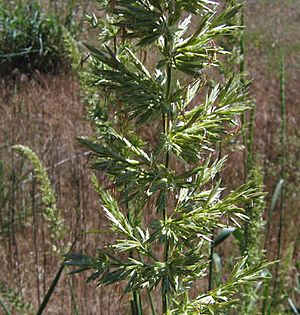Giant wildrye facts for kids
Quick facts for kids Giant wildrye |
|
|---|---|
 |
|
| Scientific classification |
|
| Kingdom: | Plantae |
| Clade: | Tracheophytes |
| Clade: | Angiosperms |
| Clade: | Monocots |
| Clade: | Commelinids |
| Order: | Poales |
| Family: | Poaceae |
| Subfamily: | Pooideae |
| Genus: | Leymus |
| Species: |
L. condensatus
|
| Binomial name | |
| Leymus condensatus (J.Presl) Á.Löve
|
|
| Script error: The function "autoWithCaption" does not exist. | |
| Synonyms | |
|
Aneurolepidium condensatum |
|
Script error: No such module "Check for conflicting parameters".
The giant wildrye, also known as Leymus condensatus, is a special type of wild rye grass. It grows naturally in California and the northern parts of Mexico. This plant is known for its unique look and how tough it is.
Contents
What is Giant Wildrye?
Giant wildrye is a type of grass that grows in big groups or clumps. Because it grows this way, it's called a "bunch grass." It stays green all year long, which is pretty cool! Its leaves are a beautiful silver-blue color, making it easy to spot.
How it Grows
This amazing grass can grow quite tall, sometimes reaching over 6 feet (about 2 meters) high. Its strong roots help it stay firmly in the ground. The clumps can also spread out, making a nice, full plant.
Where Does Giant Wildrye Live?
Giant wildrye is very good at living in dry places. It's called "drought tolerant," meaning it doesn't need much water to survive. You can find it in several different natural areas:
- Coastal Sage Scrub: This is a type of shrubland found near the coast.
- Chaparral: This is another shrubland with tough, woody plants.
- California Oak Woodlands: These are forests with oak trees, like the southern oak woodland and foothill woodland.
- Joshua Tree Woodlands: These are areas where Joshua trees grow.
It almost never grows in wetlands, which are very wet areas. This shows just how much it prefers dry conditions!
Special Features of Giant Wildrye
One interesting thing about giant wildrye is that it can "hybridize." This means it can mix its genes with another type of grass, Leymus triticoides. When they do this, they create a new kind of grass called Leymus x multiflorus. This is like two different types of plants having a baby plant that has traits from both parents!
Why is Giant Wildrye Important?
Giant wildrye is important for its environment. Because it's drought tolerant and stays green, it helps prevent soil from washing away, especially on hillsides. It also provides food and shelter for different animals. Its deep roots help keep the soil healthy.
 | Shirley Ann Jackson |
 | Garett Morgan |
 | J. Ernest Wilkins Jr. |
 | Elijah McCoy |

